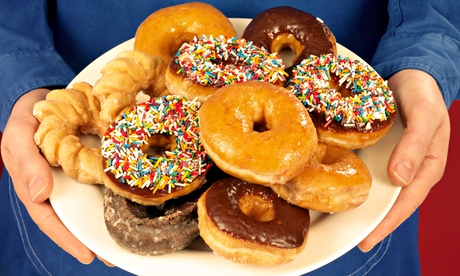
The race against obesity
continues apace. Last week, for instance, the bid to save New York's
sugar addicts, by banning large bottles of soft drinks, fell flat.
Meanwhile a small study published in the journal Neuroscience Letters
discovered receptors for stress hormones in taste buds. This could help
explain why people end up preferring sweeter foods in times of trouble.
"Stress
and sweet are obviously linked. We've known that for a very long time,"
says Rocky Parker, lead author on the study at the Monell Chemical
Senses Centre in Philadelphia. For instance, people with Addison's
disease, a rare disorder that causes a deficiency of stress hormones,
experience dramatically heightened sensitivity to sweet and salt tastes.
But if you give someone with Addison's a shot of these stress hormones,
their taste immediately returns to within normal realms of sensitivity.
The stress study
Parker's
hunch was that when stress hormones are released in a healthy body,
this might make it less sensitive to sweet taste, which could lead to,
say, its regular dose of sugar in coffee no longer cutting it. The
results of Parker's experiment (on mice) illustrated how this might
occur. He found that oral taste cells (housed within taste buds) that
detect sweet, savoury and bitter contain an abundance of receptors for
the stress hormones, glucocorticoids (GC).
If three tastes are
affected, why is sweet singled out and made the headline? First, the GC
receptors were more prevalent in cells that pick up just sweet and
umami, and second, says Parker, "umami cells make up a smaller
percentage of the population of sweet/umami cells. The majority of them
respond to sweet."
Of course, there are different types of stress.
Being chased by a lion will dump a whole load of GC in your liver to
convert fat stores into instant glucose energy. This is great both in
terms of survival and slimming. However, the modern malaise of grinding,
daily ongoing stress, often referred to as chronic stress, has the
opposite effect. You don't exercise enough and your body goes into
energy storage mode, while simultaneously, says Parker, after months of
stress (our bodies can only autoregulate against these effects for so
long), the GC "leads to long-term changes in gene expression, decreasing
the amount of sweet-taste receptor you produce in your taste buds".
That, says Parker, is the rub.
He readily admits that this is just
one tiny aspect of how stress might be making us fat. Parker cites
research by Mary Dallman, a stress and physiology expert at the
University of California in San Francisco, showing that "sweet foods
actually ameliorate the effects of stress, which I think is just so
cool". It has to be nutritive sweetness, though. Artificial sweeteners
have no effect. The body wants real sugar in the bloodstream, says
Parker. "Your central nervous system needs that to basically not freak
out."
Comfort food habits
In a review paper a few years ago
Dallman described how CG also increase insulin secretion, which leads
to craving palatable (fatty, salty and sugary) foods, while stress
hormones also activate the parts of the brain used for learning and
memory. And so if sweeties are making us feel less stressed, better
even, then our brains can easily wire themselves into a dangerous cycle
of comfort-eating. "Once stress-induced feeding becomes habitual," she
writes, "the problem-solver, executive part of the prefrontal cortex may
no longer be actively engaged in the outcome; 'comfort food' intake may
become a reflex." While occasionally eating something pleasurable to
relieve stress will not cause obesity, she reasons, "habitual relief of
life's discomforts using this means inevitably leads to obesity".
To
make matters worse, she says, "emotional 'comfort feeding', when used
repeatedly, results in primarily abdominal obesity", which is the kind
most commonly associated with heart disease and type 2 diabetes. This is
because abdominal adipose (fat storing) tissue is more sensitive to the
combined signals of insulin and glucocorticoids than in other parts of
the body.
It's beginning to sound like a conspiracy. How can we
ever possibly escape this cycle without banning sugar refinement
globally? Well, there is some consolation in Dallman's statistics on how
many people gain weight as a result of stress. She has it that 20% of
the population's eating habits don't change, 40% or less consume fewer
calories and lose weight, leaving the remaining 40% or more as the
"gainers". That's still quite a lot of us getting fat. However,
forewarned is forearmed, right? As Parker says, "if you notice that
you're getting less pleasure than usual from sweet foods, it could be
the effects of stress".
Dallman's advice is to "deliberately
increase training of our cognitive, executive prefrontal brains to
overcome emotional, habitual responses, using techniques like
mindfulness and meditation". These practices, I hear, are also rather
good stress-relief strategies. Or you can just say to yourself, as I am
wont to on occasion, "I'm too busy, and besides, there are zillions of
contradictory studies out every day", and have a piece of cake. So
what's it to be: mindfulness or cake?

No comments:
Post a Comment